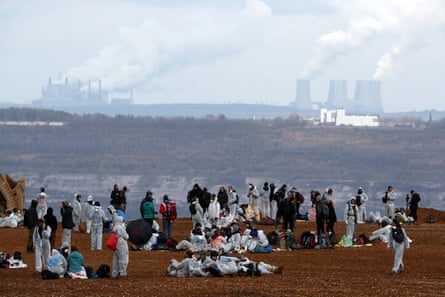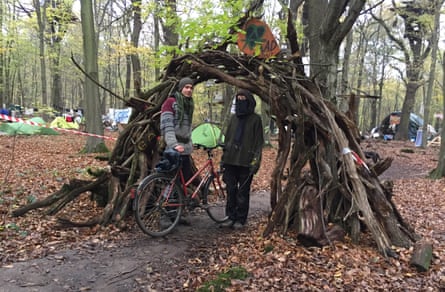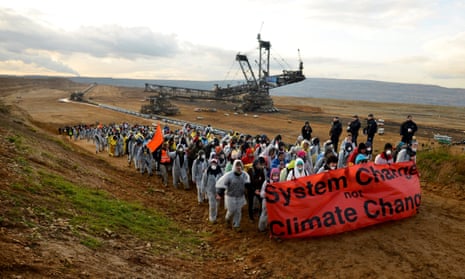A giant black mark on Germany’s environmental record is scarred on the land an hour’s drive from the venue of this year’s UN climate talks in Bonn.
Stretching across 85 square km and around 370 metres deep, the opencast coalmine near Hambach forest is the biggest hole in Europe and one of the biggest single sources of carbon on the continent.
It it also a frontline for a growing band of environmental defenders who – believing it is better to break the law than the climate – are engaged in direct action campaigns against the fossil fuel industry.
On Sunday, several thousand people occupied the RWE-run mine and surrounded the 10-storey high excavators before being ejected by police. Dozens of others have built treehouse camps in the neighbouring forest in an effort to prevent the lignite mine expanding any further.
According to the Environmental Justice Map, this is one of 70 “Blockadia” campaigns worldwide – including efforts to halt the Dakota access pipeline in the US, block coal shipments from Rotterdam and stifle coal production in Kenya – as climate activists take matters into their own hands due to frustration with the slow pace of progress by governments.
One hundred and ninety-five nations signed up to the 2015 Paris accord, which aims to keep global warming to no more than 2C. But government commitments so far have fallen far short of this goal, meaning a more dangerous 3C rise is now likely.
Although many states have ramped up investment in renewables, they have been slow to phase out fossil fuels and many continue to develop new sources of oil, coal and gas despite warnings that these need to be left in the ground.
Germany, the host of this year’s talks and often cited as a climate leader, is also culpable. Despite strong rhetoric that has earned Angela Merkel a reputation as the Klimakanzlerin (climate chancellor), its emissions have not fallen since 2009, according to a report released on Wednesday by Oil Change International.
This is because its increased use of wind and solar power has mostly filled the void left by the decommissioning of nuclear reactors, while locally mined lignite coal remains one of the main sources of energy for the industrial heartland along the Rhine. Each year, Hambach and neighbouring mines churn out 30m tonnes of this brown coal, which is dirtier than black coal.

The new study found that the Paris goals will become unachievable unless Germany phases out lignite mining within 10 years. But Germany is not only failing to set an example for other nations; according to the report, the country invests 50% more on fossil fuel exploration overseas than on renewables.
“Germany presents itself as a leader on the world stage, but it is failing to live up to promises of change in its policies at home and abroad,” said Hannah McKinnon, one of the authors of the report.
Such failings, she said, justified a greater mobilisation by civil society. “This is the time to turn up the heat,” she said. “We’ve seen that type of action has been very effective in creating conditions that force governments to act. Governments are lagging. They need to hear the message coming from all directions.”
Sunday’s protest was the latest of several recent actions known in Germany as Ende Gelände (Here and no further) that aim to peacefully disrupt digging operations in major mines.
The first took place in 2015, when 1,500 people entered RWE’s Garzweiler mine. Last year, more than 3,000 activists – many wearing white paper suits and carrying bags of straw as protection against police batons – occupied another pit and a power plant in Welzow-Süd.
In addition to these protests, which usually last less than a day, a cluster of several dozen climate activists have been living for several years in the nearby Hambach forest in an effort to slow the tree clearance that marks each expansion of the mine.
Most live in houses built high among the branches. They have barricaded the roads, dug trenches, handcuffed themselves to trunks and hidden in tunnels in an effort to protect a forest that is home to several rare species but has been steadily cleared so the lignite pit can widen. Support for the group has steadily grown in the five years they have lived there.
“There were only a dozen or so of us at the beginning, so sometimes I would be sitting alone in the camp,” recalls an activist who goes by the name of Clumsy. Now, he says, there are between 50 and 80 forest residents from all over the world – Spain, Italy, the UK, US and Canada.
“It’s nice to see people growing more aware and willing to take action. More people are aware that lignite is something we have to stop digging for. Climate change is something we need to address but that is not being done by our so-called leaders.”

Alice Owen, a university student, joined the camp for a night with friends from Denmark and Romania, who were also involved in Sunday’s pit occupation. She is also an intern at EnvJustice, which is mapping what she said was a growing number of Blockadia campaigns across the globe. “They are all dots on the map, but they are there to be joined. That’s the aim of the map,” she said.
The forest defenders draw inspiration from the writing of Naomi Klein and similar campaigns in other countries, such as those that made UK activist Swampy famous. Each tree has a name and the homes are clustered in communities with names such as Oak Town and Robin Wood. Many banners are spread between the trees bearing slogans such as “Respect Existence or Expect Resistance”.
At Bonn, activists from other nations expressed solidarity. Tom Goldtooth, an executive director of the Indigenous Environmental Network, said the RWE mines were a symbol of a global system that rewards companies that destroy the environment and criminalises local residents and campaigners who try to resist them.
On the fringe of the conference, he and other activists set up an International Rights of Nature tribunal to consider crimes against the environment.
“This is an opportunity for civil society to recognise we have the power to bring about system change,” said Goldtooth. “The people of Germany should hold a tribunal like this to hold companies and governments to account for the damage done to the natural world.”










Comments (…)
Sign in or create your Guardian account to join the discussion